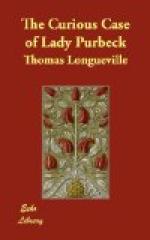“Have consulted with Sir Henry Martin on Lady Purbeck’s business, and think the best plan would be to have the case brought before the High Commission Court, which can sit without delay, in the vacation, and when the crime is proved there, the divorce can be obtained by ordinary law. Think it unadvisable to send the culprits to prison, as it is unusual for persons of their rank but advise that they may be confined in the houses of Aldermen, where in fact they would probably be more closely restrained than in prison.”
The last statement sounds curious; especially as we saw, a few pages ago, that Buckingham wrote: “an Alderman’s house is rather an honour than disparagement,” and “rather a place of entertainment than a prison.”
Buckingham now sought a fresh weapon against his sister-in-law. A couple of scoundrels, mentioned in Lanier’s letter, and named Frodsham and Lambe, men suspected of sorcery, offered to give evidence to the effect that Lady Purbeck had paid them to help her to bewitch both Purbeck and Buckingham. On the 16th of February, 1625, Buckingham wrote[71] to Coventry, the Attorney-General:—
“I perceive by the paper I have received how much I am beholding to you and do also understand by Innocent Lanier and others of the paynes [you] and my lo. Chief Justice, have taken in the business concerning the Lady Purbeck for which I thanke you ... but I did hope that you would have some more discovered before this tyme. If Lambe and ffrodsham may escape the one by saying what he did was but jugglinge and the other by seeming to affect to be thought a juggler I believe all that hath been already discovered of the truth of this business will be deluded. I do therefore desire that you will take some sound course with them to make them speake more directly and truly to the point and to bout (?) them from their shifts, for Lambe hath hitherto by such means played mock with the world to preserve himself. I desire you to acquaint Innocent Lanier (who is appointed by my brother to sollicit this business) with all the particulars and publique speeche that he may the better know how to imploy this paynes for the discovering of the knot of this villany. I desire you to say well what is fitt to be done in the divorce of my brother and to notify me your opinions thereon and (if you thinke it fitt to be pursued in this) what is the speediest work that may be taken therein. And you discover the best serving friend.
“I rest, &c.
“NEWMARKET.”
If this was true it would seem that Purbeck himself suspected that he had been bewitched.
Yet on that very same day Buckingham wrote to Heath, the Solicitor-General, expressing his opinion that, unless Lady Purbeck were put in prison, Lord Purbeck would not “be kept from her,” which does not look as if he can have been afraid lest she should bewitch him. The letter runs:—




